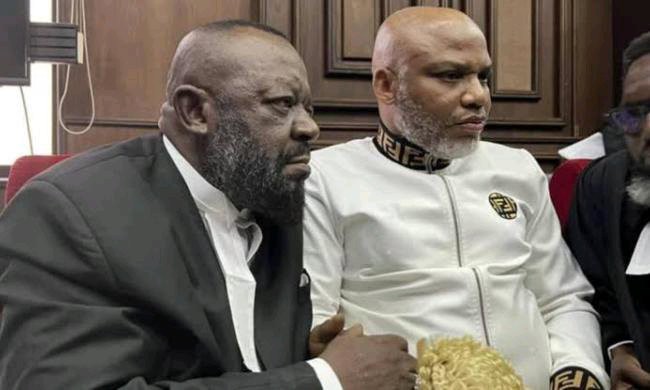The arrest and detention of Nnamdi Kanu, leader of the Indigenous People of Biafra (IPOB), continue to be a subject of significant controversy and debate. The issue reignited recently when Ohanaeze Ndigbo, the apex Igbo socio-cultural organization, made a public appeal to President Bola Tinubu, requesting that Kanu be granted a political pardon as part of Nigeria’s 64th independence anniversary celebrations. According to Sahara Reporters, this appeal, made by Chief Damian Okeke-Ogene, Ohanaeze’s National Vice President, was purportedly aimed at fostering peace and ending the escalating violence in the Southeast.
However, this request has sparked a strong counter-reaction from Barrister Aloy Ejimakor, the special legal representative for Kanu. Ejimakor called the plea “shocking,” noting that Kanu has not been convicted of any crime. According to him, it would be highly inappropriate to request a pardon for someone who hasn’t been proven guilty in a court of law. “Pardon is for convicted felons,” Ejimakor asserted, highlighting the fundamental difference between being detained and being convicted. He further stressed that Kanu’s only “offense” was demanding political justice for the people of Biafra, which, by his legal assessment, cannot be construed as a crime.
This debate opens a critical conversation about the concept of justice in Nigeria. Is it right to ask for a pardon when an individual hasn’t even been proven guilty? And what does it say about the judicial process when socio-political groups bypass the courts to seek political solutions? By requesting a pardon, is Ohanaeze Ndigbo undermining Kanu’s right to a fair trial, or is it a pragmatic move to address a politically sensitive issue?
There is a broader discussion to be had here regarding the role of political pardons and their impact on justice. Should political leaders use pardons as a tool to ease tensions, even if it means circumventing due legal processes? The Ohanaeze’s request, while possibly well-intentioned, seems to reflect a lack of faith in Nigeria’s judicial system to deliver a just verdict for Kanu. If the judiciary is bypassed in favor of political resolutions, what message does that send about the sanctity of the rule of law?
Furthermore, the request for a pardon carries an implicit acknowledgment that Kanu’s actions were wrong—something his supporters vehemently deny. To them, Kanu’s agitation for Biafra is a legitimate pursuit of self-determination, a right recognized under international law. By seeking a pardon, Ohanaeze may inadvertently be legitimizing the accusations of terrorism and treason leveled against Kanu by the Nigerian government.
This divergence of perspectives on how best to resolve Kanu’s situation illustrates a deeper crisis in Nigeria: the lack of alignment between political leadership, socio-cultural groups, and the judiciary. It is a reflection of a fragmented nation where different factions pursue different, sometimes conflicting, paths to peace and stability. While Ohanaeze’s call may have been intended to foster harmony, it raises questions about the erosion of judicial independence and the dangers of politicizing justice.
Ultimately, the discourse around Nnamdi Kanu’s detention touches on fundamental issues of fairness, governance, and the rights of individuals versus the authority of the state. Should Kanu be given a political pardon, or should the courts decide his fate? And if Kanu is indeed innocent, as his lawyer asserts, wouldn’t justice demand that he be exonerated by the courts rather than politically “pardoned”? These questions are crucial, not just for Kanu, but for the broader principles of justice and rule of law in Nigeria.

